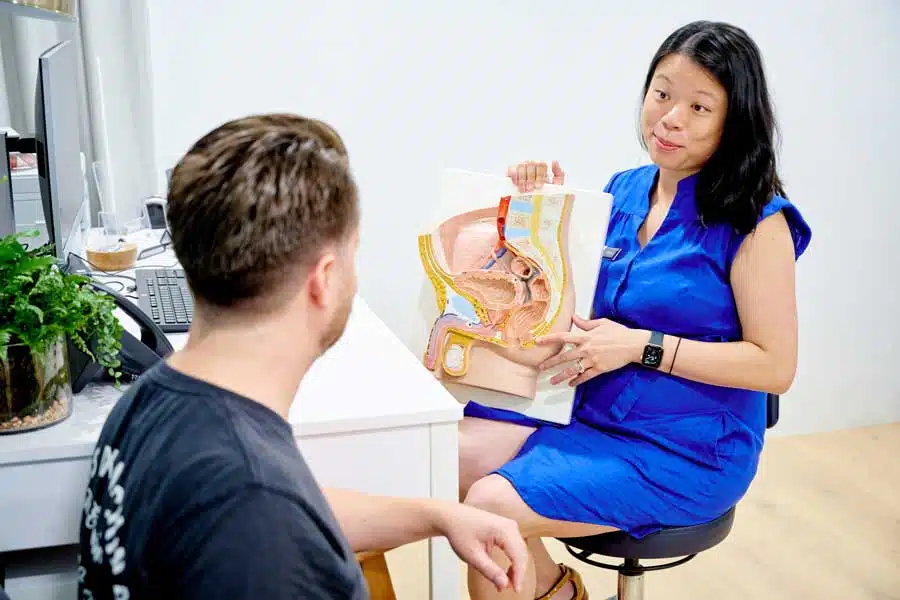Are you an adult who is struggling with bed wetting? If so, you’re not alone. 1 in 4 Australians deal with some form of incontinence issue, whether that be daytime wetting, night-time wetting, or other bladder and bowel issues.
Let’s learn more about what night-time bedwetting, also known as nocturnal enuresis, is and the things you can do to address this condition.
What is Nocturnal Enuresis?
Nocturnal Enuresis, also referred to as night-time incontinence or night-time wetting, is a condition where a person has the involuntary loss of urine during sleep.
This is not to be confused with the same kind of involuntary urination that is common for young children. Night-time wetting is a common issue in young children, especially as a child learns to deal with bladder control during toilet training. Nocturnal enuresis in adults, though, is a condition that has different causes.
There are actually two different medical terms for bed wetting, depending on the specifics of your bladder dysfunction issue. The definitions are as follows:
Primary Nocturnal Enuresis – Primary enuresis refers to issues with involuntary urination that develops when sleep dryness was not achieved during childhood, bringing the issues into adulthood.
Secondary Nocturnal Enuresis – Secondary enuresis refers to issues with involuntary urination where night-time wetting begins late in childhood or adulthood, after sleep dryness was already achieved.
Nocturnal Enuresis Symptoms
The main symptom of nocturnal enuresis is the involuntary loss of urine when you are sleeping. There are other symptoms that can develop alongside this, though, as a result of dealing with a bladder issue.
The development of issues such as depression and anxiety can happen as a result of dealing with nocturnal enuresis. Nocturnal enuresis in adulthood can feel embarrassing, negatively impacting a person’s self-esteem. It can cause people to withdraw, avoid leaving home, have poor sleep, and avoid sleeping at places overnight.
Nocturnal Enuresis Causes
There are many reasons why a person may be struggling with an incontinence issue like nocturnal enuresis. Common causes include:
- Reduced bladder capacity
- Reduce ability to sense bladder fullness
- Neurological disorders such as Parkinson’s, Dementia, or Alzheimer’s
- Sleep apnea
- Kidney stones
- Overactive bladder syndrome
- Stress/anxiety
- Genetics
- Hormone imbalances
- Cancers
Living With Nocturnal Enuresis: Anna’s Story
To learn more about what it’s like to live with nocturnal enuresis, let’s explore Anna’s story (not her real name).
Anna is a 50-year-old adult who has not struggled with bedwetting since childhood toilet-training, only to find herself waking up to wet sheets a few times a week.
She feels embarrassed to wake up to wet sheets, wondering why she is suddenly struggling with bladder control. As she feels ashamed, Anna sets out to hide it from people at home. She begins to use plastic sheets at night. She finds herself doing laundry daily, even hiding the sheets from her children!
Anna tries to reduce fluid intake before bed and going to the toilet before falling asleep to empty her bladder. Still, she rarely has a dry night, and the bedwetting persists.
As a relatively healthy person, Anna now begins to panic, thinking the wetting could be a result of conditions like a urinary tract infection, bladder cancer, or kidney stones. This is when she decides to visit her GP, who rules these concerns out, but suggests booking an appointment with a pelvic physiotherapist to help with the issue.
Because Anna reached out for help, she was able to get the treatment she needed to address the issue. Her physiotherapist ensured that she had an effective action plan in place to overcome her condition, and, over time, the issue was resolved.
There are a lot of people out there who have stories similar to Anna, but not all of them have a happy ending. It’s common for people to suffer in silence, too embarrassed to ask for help. This is why it’s vital that you reach out to medical professionals, to start treatment and get the help you deserve.
How Common is Nocturnal Enuresis?
1 in 3 women and 1 in 10 men in Australia deal with some kind of bladder control problem.
There are lots of enuretic children and adults across Australia dealing with involuntary urination leakage like nocturnal enuresis. It can be a result of an existing medical condition, or it could simply be the result of some form of trauma or stressful event.
Regardless of why a person may struggle with night-time wetting, it’s important for them to know they are not alone, and there are treatment options out there to help them address the condition.
How Do You Diagnose and Treat Nocturnal Enuresis?
This journey begins with meeting with a healthcare professional for a diagnosis. Usually, you will give them a list of your symptoms. They may also conduct a physical examination, which includes blood tests and a pelvic ultrasound.
Next comes the course of treatment. Your healthcare professional can develop a plan catered to you to address night-time wetting, which may include:
- Lowering your fluid intake
- Cutting out bladder irritants like sugar, caffeine, alcohol
- Using a bedwetting alarm for alarm therapy
- Implementing absorbent/waterproof bedding
- Pelvic floor muscle training
- Bladder training
There are also some lifestyle changes one can make to deal with incontinence issues. Click here to read some helpful tips from the Continence Foundation of Australia.
Reach Out and Get Help
If you are an adult dealing with night-time wetting, you’re not alone. It’s possible to seek out treatment to address your symptoms and get back to living a normal life.
If you would like to learn more about potential treatment plans for nocturnal enuresis, reach out to our team at Sydney Pelvic Clinic!
Click here to ask about a consultation and begin your treatment journey.

